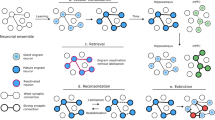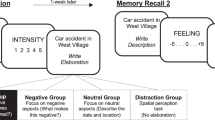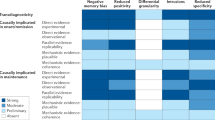Abstract
Declarative and emotional memories are key to quality of life and day-to-day functioning. The absence of memory or the inability to recall memories properly in an emotional context leads to dysfunction but, paradoxically, memories that generate too much emotion can be equally disabling.
This is a preview of subscription content, access via your institution
Access options
Subscribe to this journal
Receive 12 print issues and online access
$189.00 per year
only $15.75 per issue
Buy this article
- Purchase on Springer Link
- Instant access to full article PDF
Prices may be subject to local taxes which are calculated during checkout
Similar content being viewed by others
References
Corkin, S. What's new with the amnesic patient H.M.? Nature Rev. Neurosci. 3, 153–160 (2002).
Brown, S. & Shafer, E. An investigation into the functions of the occipital and temporal lobes of the monkey's brain. Phil. Trans. R. Soc. Lond. B 179, 303–327 (1888).
American Psychiatric Association. Diagnostic and statistical manual of mental disorders 4th edn (APA, Washington DC, 2000).
Yehuda, R. & LeDoux, J. Response variation following trauma: a translational neuroscience approach to understanding PTSD. Neuron 56, 19–32 (2007).
Yehuda, R. Post-traumatic stress disorder. N. Engl. J. Med. 346, 108–114 (2002).
Morris, R. G. M. Elements of a neurobiological theory of hippocampal function: the role of synaptic-plasticity, synaptic tagging and schemas. The EJN Award Lecture. Eur. J. of Neurosci. 23, 2829–2846 (2006).
Parker, E. S., Cahill, L. & McGaugh, J. L. A case of unusual autobiographical remembering. Neurocase 12, 35–49 (2006).
Frey, J. U. & Morris, R. G. M. Synaptic tagging and long-term potentiation. Nature, 385, 533–536 (1997).
Reymann, K. G. & Frey, J. U. The late maintenance of hippocampal LTP: requirements, phases, 'synaptic tagging', 'late-associativity' and implications. Neuropharmacology 52, 24–40 (2007).
Lisman, J. E. & Grace, A. A. The hippocampal–VTA loop: controlling the entry of information into long-term memory. Neuron 46, 703–13 (2005).
Joëls, M., Pu, Z., Wiegert, O., Oitzl, M. S. & Krugers, H. J. Learning under stress: how does it work? Trends Cogn. Sci. 10, 152–158 (2006).
Redondo, R. L. et al. Synaptic tagging and capture: differential role of distinct calcium/calmodulin kinases in protein synthesis-dependent long-term potentiation. J. Neurosci. 30, 4981–4989 (2010).
Nader, K., Schafe, G. E. & LeDoux, J. E. The labile nature of consolidation theory. Nature Rev. Neurosci. 1, 216–219 (2000).
Bransford, J. D. Human Cognition: Learning, Understanding and Remembering (Wadsworth, Belmont, California, 1979).
Tse, D. et al. Schemas and memory consolidation. Science 316, 76–82 (2007).
Yehuda, R. et al. Changes in relative glucose metabolic rate following cortisol administration in aging veterans with posttraumatic stress disorder: an FDG-PET neuroimaging study. J. Neuropsychiatry Clin. Neurosci. 21, 132–143 (2009).
Foa, E. B. Psychosocial therapy for posttraumatic stress disorder. J. Clin. Psychiatry 67, Suppl. 2, 40–45 (2006).
Ethics declarations
Competing interests
The authors declare no competing financial interests.
Related links
Rights and permissions
About this article
Cite this article
Yehuda, R., Joëls, M. & Morris, R. The memory paradox. Nat Rev Neurosci 11, 837–839 (2010). https://doi.org/10.1038/nrn2957
Issue Date:
DOI: https://doi.org/10.1038/nrn2957
This article is cited by
-
On Disruption of Fear Memory by Reconsolidation Blockade: Evidence from Cannabidiol Treatment
Neuropsychopharmacology (2012)



